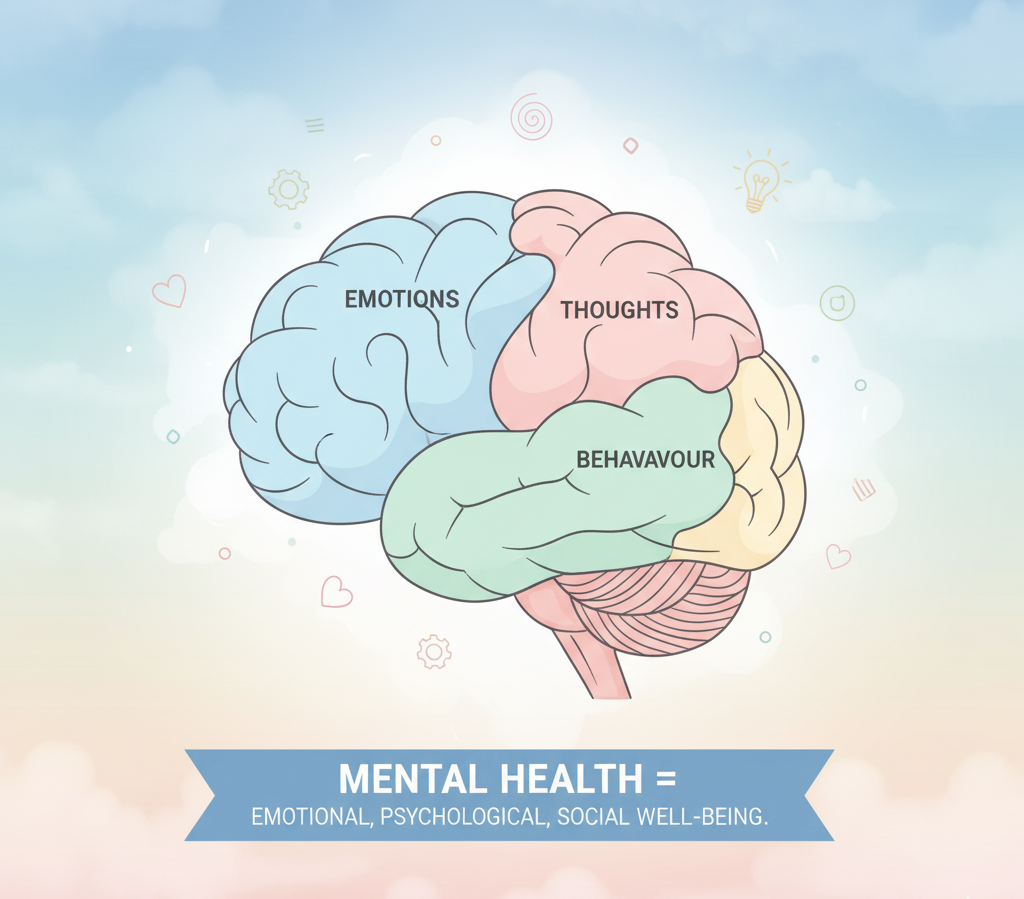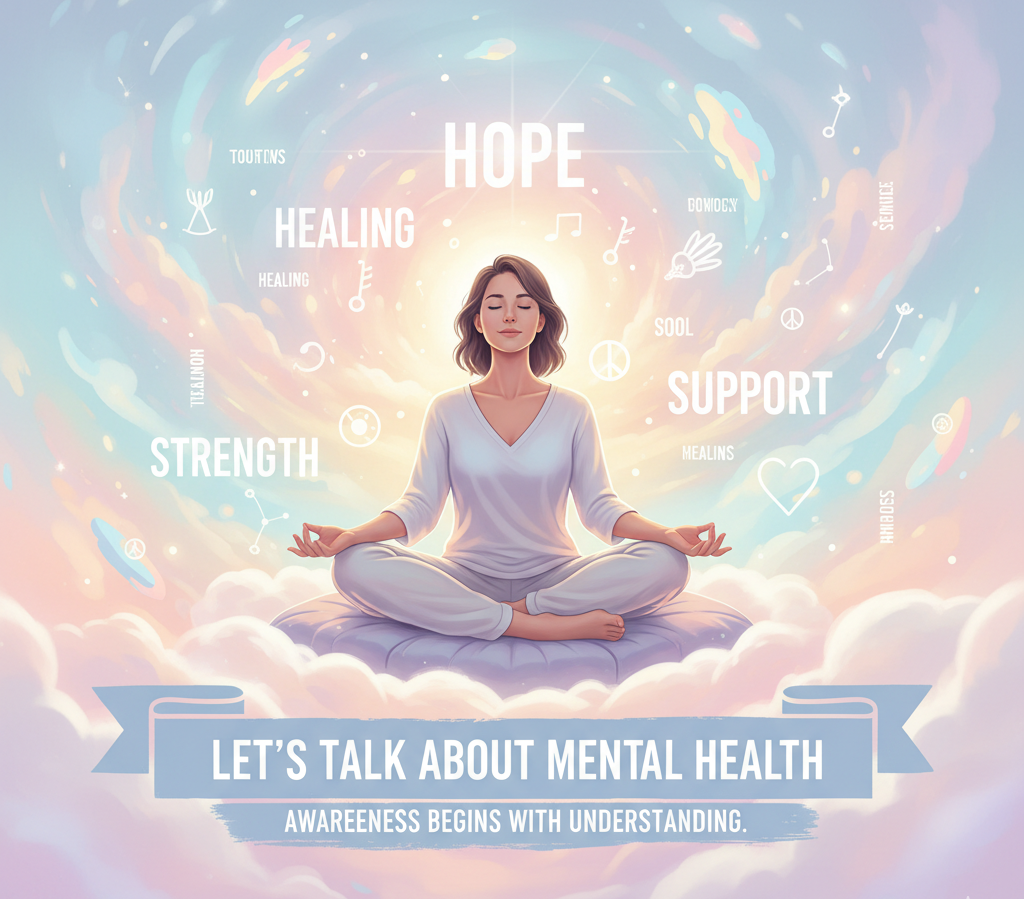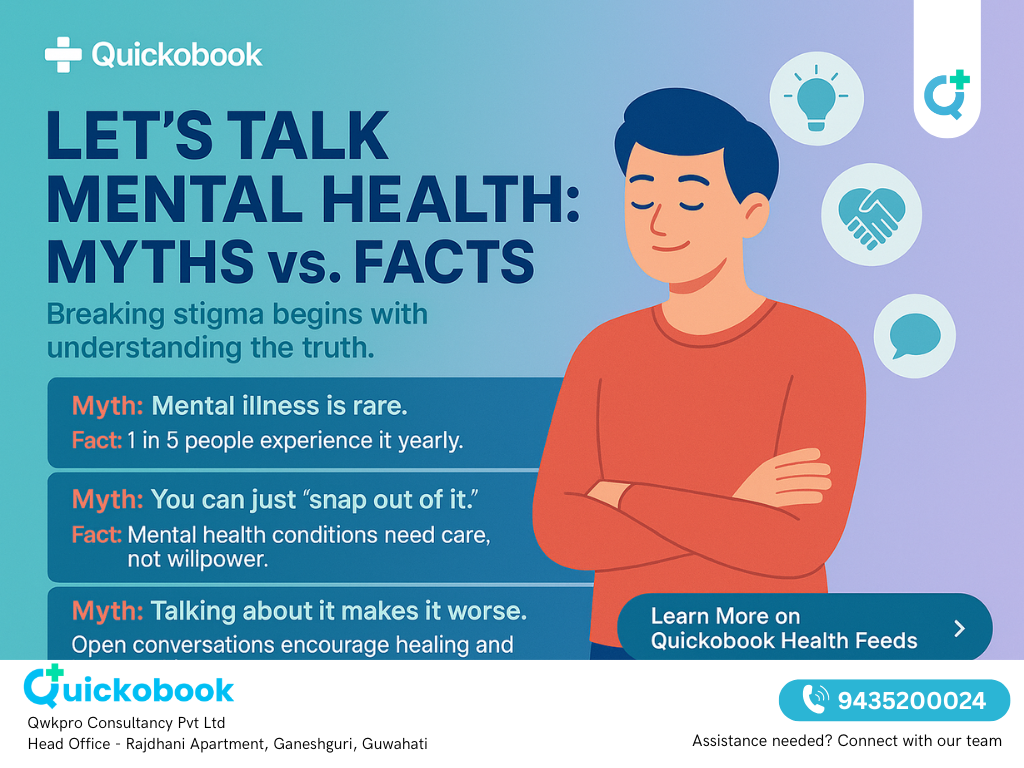Introduction
In India, mental health is often misunderstood or ignored due to cultural stigma and misinformation. While society has made progress in talking about depression, anxiety, and emotional wellness, myths still prevent many from seeking help. This blog clears the confusion, separates facts from fiction, and empowers you to care for your mind just as you do your body.

Understanding Mental Health
What Is Mental Health?
Mental health refers to your emotional, psychological, and social well-being. It affects how you think, feel, and act in daily life. It also influences how you handle stress, relate to others, and make choices. Good mental health is not the absence of problems—it’s about resilience, coping skills, and balance.
Common Mental Health Conditions
- Anxiety disorders – Persistent worry or fear that interferes with daily life.
- Depression – Continuous sadness, loss of interest, or hopelessness.
- Bipolar disorder – Shifting moods from highs (mania) to lows (depression).
- Obsessive-compulsive disorder (OCD) – Repetitive thoughts and rituals.
- Post-traumatic stress disorder (PTSD) – Distress following trauma.

Mental Health Myths vs. Facts
Myth 1: Mental illness is rare.
Fact: Nearly 1 in 7 Indians experiences some form of mental disorder, according to the National Mental Health Survey. It’s more common than most realize.
Myth 2: Only weak people have mental health problems.
Fact: Mental illness is not a sign of weakness. It’s a medical condition that can affect anyone, regardless of age, gender, or background.
Myth 3: Talking about mental health makes it worse.
Fact: Speaking openly helps in recovery. Conversations reduce stigma and encourage others to seek help early.
Myth 4: You can just “snap out of it.”
Fact: Mental illnesses require professional care, just like physical illnesses. Therapy, medication, and lifestyle changes are proven treatments.
Myth 5: Psychologists and psychiatrists do the same job.
Fact:
- A psychologist provides counselling and therapy to manage thoughts and emotions.
- A psychiatrist is a medical doctor who can diagnose and prescribe medication when needed.
Myth 6: Children don’t suffer from mental health issues.
Fact: Kids and teens can experience anxiety, ADHD, learning difficulties, and depression. Early support makes a huge difference.
Myth 7: Seeking therapy means you’re crazy.
Fact: Therapy is for anyone struggling with stress, anxiety, trauma, or emotional imbalance—it’s a form of self-care, not madness.
READ ALSO Food Systems Largest Violators Of Planetary Limits: 2025 Eat-lancet Commission
Causes and Risk Factors
Mental health problems can arise from multiple causes:
- Genetics: Family history of depression or bipolar disorder.
- Stress: Work pressure, financial issues, relationship conflicts.
- Biological factors: Brain chemistry and hormonal changes.
- Substance abuse: Alcohol or drug misuse worsens mental instability.
- Trauma: Abuse, neglect, or loss can leave lasting scars.
Signs and Symptoms to Watch For
- Continuous sadness or mood swings
- Irritability or anger
- Withdrawal from friends and family
- Sleep or appetite changes
- Loss of concentration
- Feelings of hopelessness or guilt
- Thoughts of self-harm (immediate medical help needed)
Diagnosis and Treatment
Diagnosis
A psychologist or psychiatrist can diagnose mental health conditions using:
- Clinical interviews
- Psychological assessments
- Observation and history
Treatment Options
- Therapy/Counselling: Cognitive Behavioural Therapy (CBT), talk therapy, mindfulness-based sessions.
- Medication: Antidepressants, anti-anxiety drugs, or mood stabilizers prescribed by psychiatrists.
- Lifestyle management: Regular exercise, meditation, healthy sleep, and nutrition.
- Support groups: Connecting with people who share similar experiences.
Role of Psychologists and Psychiatrists
- Psychologist: Helps you explore thoughts, emotions, and behaviours to create coping strategies.
- Psychiatrist: Focuses on medical treatment and medication management for severe cases.
Together, they form a holistic care team to support your recovery.
How to Maintain Good Mental Health
- Practice mindfulness and deep breathing.
- Sleep 7–8 hours daily.
- Limit screen time and social media.
- Exercise at least 30 minutes a day.
- Eat balanced, nutrient-rich meals.
- Stay connected with family and friends.
- Set realistic goals and take breaks.
Prevention and Early Intervention
- Know the warning signs and act early.
- Talk about mental health at home and in workplaces.
- Encourage open conversations in schools and colleges.
- Access online therapy or helplines for immediate support.
- Regularly schedule mental health check-ups—just like physical health screenings.
When to See a Psychologist or Psychiatrist
Seek professional help if:
- You feel persistently sad or anxious for over two weeks.
- Work, relationships, or studies are suffering.
- You have thoughts of self-harm or suicide.
- You’re using alcohol or drugs to cope.
- Family members express concern about your mood or behaviour.
Risks of Ignoring Mental Health
- Chronic depression or anxiety
- Substance dependence
- Social withdrawal
- Poor work or academic performance
- Suicidal tendencies
Ignoring early signs can make conditions worse. Early intervention saves lives.
Conclusion
Mental health is just as important as physical health. By understanding the facts, rejecting myths, and seeking timely help from a psychologist or psychiatrist, you can build emotional strength and lead a balanced life. Remember—asking for help is a sign of courage, not weakness.
Quickobook CTA
If you or someone you know is struggling with mental health issues, don’t wait.
???? Book an appointment with a trusted psychologist or psychiatrist on Quickobook.com today.
Quickobook connects you with certified mental health experts near you for in-person or online consultations.
Disclaimer:
This article is for educational purposes only and does not replace professional medical advice. Always consult a qualified psychologist or psychiatrist for diagnosis or treatment.
Top 50 FAQs: Mental Health Awareness
Q1. What is mental health?
A. It refers to emotional and psychological well-being affecting how we think, feel, and act.
Q2. Is anxiety a mental illness?
A. Yes, anxiety disorders are the most common mental health conditions worldwide.
Q3. Can stress cause mental illness?
A. Chronic stress can trigger or worsen depression and anxiety.
Q4. When should I see a psychologist?
A. If you feel persistently sad, anxious, or unable to cope with daily tasks.
Q5. What’s the difference between a psychologist and a psychiatrist?
A. Psychologists provide therapy; psychiatrists prescribe medication.
Q6. Can mental illness be cured?
A. Many conditions can be managed effectively with treatment and lifestyle changes.
Q7. Is depression common in India?
A. Yes, millions of Indians experience depression every year.
Q8. How can I help a friend with anxiety?
A. Listen without judgment and encourage them to seek professional help.
Q9. Does meditation help mental health?
A. Yes, mindfulness reduces stress and improves focus.
Q10. Are antidepressants safe?
A. Yes, when prescribed and monitored by a psychiatrist.
Q11. Can poor sleep affect mental health?
A. Absolutely—sleep deprivation worsens anxiety and depression.
Q12. Is therapy confidential?
A. Yes, all therapy sessions are private and protected.
Q13. Can teenagers have depression?
A. Yes, adolescent depression is increasingly common.
Q14. How long does therapy take?
A. It varies; some people feel better in weeks, others need months.
Q15. Are online therapy sessions effective?
A. Yes, many people benefit from video counselling.
Q16. What causes mental illness?
A. A mix of genetics, stress, trauma, and lifestyle factors.
Q17. How do I choose a good psychologist?
A. Look for licensed professionals with experience in your specific concern.
Q18. Is anxiety different from stress?
A. Yes, stress is short-term; anxiety is ongoing and often without a clear trigger.
Q19. What foods improve mental health?
A. Omega-3s, fruits, vegetables, and whole grains.
Q20. Can exercise treat depression?
A. Regular physical activity boosts mood-regulating hormones.
Q21. Do men experience mental health issues?
A. Yes, but often hesitate to seek help due to stigma.
Q22. What is therapy like?
A. It’s a safe space to discuss feelings, learn coping strategies, and find clarity.
Q23. Is medication always needed?
A. Not always—many improve with therapy alone.
Q24. Can social media harm mental health?
A. Excessive use can lead to anxiety, loneliness, and low self-esteem.
Q25. What’s the role of family in recovery?
A. Supportive families help patients stick to treatment and heal faster.
Q26. How can workplaces support mental health?
A. Through awareness programs, counselling, and stress management.
Q27. Are children with ADHD just naughty?
A. No, ADHD is a neurodevelopmental disorder requiring therapy.
Q28. What’s stigma in mental health?
A. Negative attitudes that discourage people from seeking help.
Q29. Can religion or spirituality help?
A. For many, spiritual practices offer peace and emotional balance.
Q30. What happens during a psychiatric evaluation?
A. The psychiatrist asks questions about your mood, thoughts, and lifestyle.
Q31. How can I talk about mental health with family?
A. Be honest, calm, and share reliable information.
Q32. Can diet affect mood?
A. Yes, nutrition directly influences brain function.
Q33. What’s panic disorder?
A. Sudden attacks of intense fear, often with physical symptoms like palpitations.
Q34. How do I manage exam stress?
A. Study in intervals, practice deep breathing, and sleep well.
Q35. Can alcohol cause depression?
A. Yes, alcohol can worsen mood disorders.
Q36. What’s a mental health emergency?
A. Suicidal thoughts, self-harm, or severe panic attacks require immediate help.
Q37. What’s CBT therapy?
A. Cognitive Behavioural Therapy helps change negative thought patterns.
Q38. Are mental health issues hereditary?
A. They can run in families but are influenced by environment too.
Q39. Can music therapy help?
A. Yes, it can reduce anxiety and improve mood.
Q40. How does yoga improve mental health?
A. It enhances relaxation and lowers cortisol levels.
Q41. Can I stop medication once I feel better?
A. Only under a psychiatrist’s supervision.
Q42. What’s seasonal affective disorder?
A. Depression that occurs during specific seasons, usually winter.
Q43. Do pets help mental health?
A. Yes, companionship reduces loneliness and stress.
Q44. What are therapy goals?
A. Understanding emotions, improving relationships, and managing stress.
Q45. Can trauma lead to depression?
A. Yes, unresolved trauma can cause lasting sadness or fear.
Q46. Are mental health issues treatable?
A. Yes, with therapy, medication, and support systems.
Q47. What’s the best time to see a psychologist?
A. Anytime you feel overwhelmed or unable to cope.
Q48. Can I recover fully?
A. Many people achieve long-term recovery with proper care.
Q49. What’s mental health awareness month?
A. May is globally recognized to spread awareness about mental health.
Q50. How can I start improving my mental health today?
A. Talk to someone you trust, practice gratitude, and seek professional help.









Comments (0)
No comments yet. Be the first to share your thoughts!
Leave a Comment